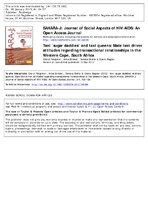| dc.contributor.author | Potgieter, Cheryl | |
| dc.contributor.author | Strebel, Anna | |
| dc.contributor.author | Shefer, Tamara | |
| dc.contributor.author | Wagner, Claire | |
| dc.date.accessioned | 2014-10-17T10:43:45Z | |
| dc.date.available | 2014-10-17T10:43:45Z | |
| dc.date.issued | 2012 | |
| dc.identifier.citation | Potgieter, C., et al. (2013). Taxi ‘sugar daddies’ and taxi queens: male taxi driver attitudes regarding transactional relationships in the Western Cape, South Africa. SAHARA-J: Journal of Social Aspects of HIV/AIDS, 9(4): 192-199 | en_US |
| dc.identifier.issn | 1729-0376 | |
| dc.identifier.uri | http://hdl.handle.net/10566/1263 | |
| dc.description.abstract | Media reports are emerging on the phenomenon of young girls who travel with older mini-bus taxi drivers, and who are thought to have sex with the drivers in exchange for gifts and money. The extent to which such relationships might facilitate unsafe sexual
practices and increased risks for both the men and the young women, often referred to as taxi queens, remains an important question in the light of the current challenges of HIV/AIDS in sub-Saharan Africa. However, very little research has been undertaken on this issue, especially regarding the perceptions and experiences of taxi drivers. Thus this paper aims to provide some preliminary findings on taxi drivers’ attitudes and beliefs about taxi queens and their relationships with taxi drivers. A 22-item questionnaire was administered to 223 male taxi drivers in two regions in the Western Cape Province, South Africa. Taxi drivers in this study largely saw the relationship between taxi drivers and the young girls who ride with them as providing status for both the girls and drivers, and there seemed to be recognition of the transactional nature of the relationship between taxi drivers and taxi queens. The stigmatisation of young girls who ride with taxi drivers was evident. Drivers had knowledge and awareness of the risks of unsafe sex and supported condom use, although there appeared to be some uncertainty and confusion about the likelihood of HIV infection between drivers and girls. While taxi drivers recognised the role of alcohol in relationships with young girls, they seemed to deny that the abuse of drugs was common. The study highlights a number of key areas that need to be explored with men in the taxi industry, in order to address risk behaviours for both taxi drivers and the
girls who ride with them. | en_US |
| dc.language.iso | en | en_US |
| dc.publisher | Taylor & Francis Open | en_US |
| dc.rights | © 2012 Potgieter, et al.; licensee SAHRA-J. This is an Open Access article distributed under the terms of the Creative Commons Attribution License, which permits unrestricted use, distribution, and reproduction in any medium, provided the original work is properly cited. | |
| dc.source.uri | http://dx.doi.org/10.1080/17290376.2012.745286 | |
| dc.subject | Taxi drivers | en_US |
| dc.subject | Taxi queens | en_US |
| dc.subject | Intergenerational sex | en_US |
| dc.subject | Transactional sex | en_US |
| dc.subject | HIV/AIDS risk | en_US |
| dc.title | Taxi ‘sugar daddies’ and taxi queens: male taxi driver attitudes regarding transactional relationships in the Western Cape, South Africa | en_US |
| dc.type | Article | en_US |
| dc.privacy.showsubmitter | false | |
| dc.status.ispeerreviewed | true | |

